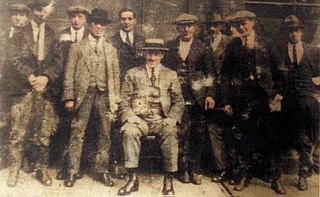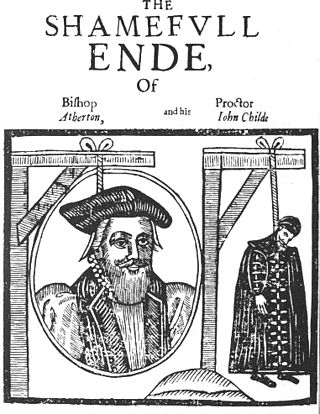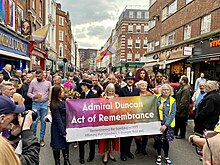
Soho is an area of the City of Westminster in the West End of London. Originally a fashionable district for the aristocracy, it has been one of the main entertainment districts in the capital since the 19th century.
Lesbian, gay, bisexual, transgender, queer, intersex, and asexual (LGBTQIA+) people frequently experience violence directed toward their sexuality, gender identity, or gender expression. This violence may be enacted by the state, as in laws prescribing punishment for homosexual acts, or by individuals. It may be psychological or physical and motivated by biphobia, gayphobia, homophobia, lesbophobia, and transphobia. Influencing factors may be cultural, religious, or political mores and biases.
The 1999 London nail bombings were a series of bomb explosions in London, England. Over three successive weekends between 17 and 30 April 1999, homemade nail bombs were detonated in Brixton in South London; at Brick Lane, Spitalfields, in the East End; and at the Admiral Duncan pub in Soho in the West End. Each bomb contained up to 1,500 4-inch (100 mm) nails, in holdalls that were left in public spaces. The bombs killed three people and injured 140 people, four of whom lost limbs.

Admiral Adam Duncan, 1st Viscount Duncan, KB was a British admiral who defeated the Dutch fleet off Camperdown on 11 October 1797. This victory is considered one of the most significant actions in naval history.

Old Compton Street is a road that runs east–west through Soho in the West End of London, named after Henry Compton who raised funds for St Anne's Church in 1686. The area, particularly this street, became home to French Protestant refugees in 1681. Known for its diverse and artistic traditions, the street housed businesses, artists, philosophers, and was frequented by communists and proto-beatniks. The Algerian Coffee Stores, one of the oldest shops on the street, was established in 1887. Post World War II, the street became a center for modern and trad jazz. Since the 1970s, Old Compton Street has been a focal point for London's gay community, with numerous gay bars, restaurants, and specialty shops. The Admiral Duncan pub, a notable gay venue, was bombed in 1999 in a hate crime attack. The street is also home to the Prince Edward Theatre.

David Roger Morley was a barman who was fatally attacked by a group of youths near Waterloo station in London on the morning of 30 October 2004. The attack garnered widespread media coverage as a fatality of a violent trend known as happy slapping and due to the belief that the attack was motivated by homophobia.

His Majesty's Prison Belmarsh is a Category A men's prison in Thamesmead, southeast London, England. The prison is used for high-profile cases, particularly those concerning national security. Within the grounds is the High Security Unit (HSU), which consists of 48 single cells. It is run by His Majesty's Prison Service. The prison has been called "Britain's Guantanamo Bay" due to the long-term detention of terrorism suspects without charge. Belmarsh is also notoriously known as "Hellmarsh" due to the fact that Belmarsh is considered the toughest prison in the UK and due to the high number of physical and authority abuses reported by both the prison's inmates and by human rights activists.
The Guildford pub bombings occurred on 5 October 1974 when the Provisional Irish Republican Army (IRA) detonated two 6-pound (2.7-kilogram) gelignite bombs at two pubs in Guildford, Surrey, England. The pubs were targeted because they were popular with British Army personnel stationed at Pirbright barracks. Four soldiers and one civilian were killed. Sixty-five people were wounded.
The International Lesbian, Gay, Bisexual, Transgender & Intersex Law Association is an international association of gay, lesbian, bisexual, transgender and intersex lawyers. The group also welcomes law professors, judges, law students, paralegals and laypersons, as long as they are committed to LGBTI equality under the law.

Charles "Darby" Sabini was a British-Italian mob boss and considered protector of Little Italy during the interwar years.
The Birmingham Boys were a street gang whose power extended from the North of England to London's underworld, between the 1910s and 1930s. They lost control of the South East racecourses to the Sabini gang. In modern times they gained recognition due to the TV series Peaky Blinders.
The Hoxton Gang was an independent street gang based in Soho, London, during the interwar years. They were one of several West End gangs which fought against Charles "Darby" Sabini and the "Italian Mob", specifically over control of gambling clubs or "spielers".

The history of violence against LGBT people in the United Kingdom is made up of assaults on gay men, lesbians, bisexual, transgender, queer and intersex individuals (LGBTQI), legal responses to such violence, and hate crime statistics in the United Kingdom. Those targeted by such violence are perceived to violate heteronormative rules and religious beliefs and contravene perceived protocols of gender and sexual roles. People who are perceived to be LGBTQI may also be targeted.

The First Domino is a 2009 English play about a fictional terrorist bomber, written by Jonathan Cash, who was injured in the 1999 bombing of the Admiral Duncan pub in Soho, London by David Copeland.
Events from 1999 in England
The LGBT community in London is one of the largest within Europe. LGBT culture of London, England, is centred on Old Compton Street in Soho. There are also LGBT pubs and restaurants across London in Haggerston, Dalston and Vauxhall.
St Anne's Churchyard, also known as St Anne's Gardens, is a public park on Wardour Street in Soho, London. Formerly the churchyard of St Anne's, Soho, it was closed to burials in 1853 by Act of Parliament.
Ronald Knight was an English convicted criminal and nightclub owner. He became well-known through his marriage to the actress Barbara Windsor.
Graeme McLagan is a British journalist who was Home Affairs correspondent for BBC News, specialising in crime and the police about which he has written three books.











